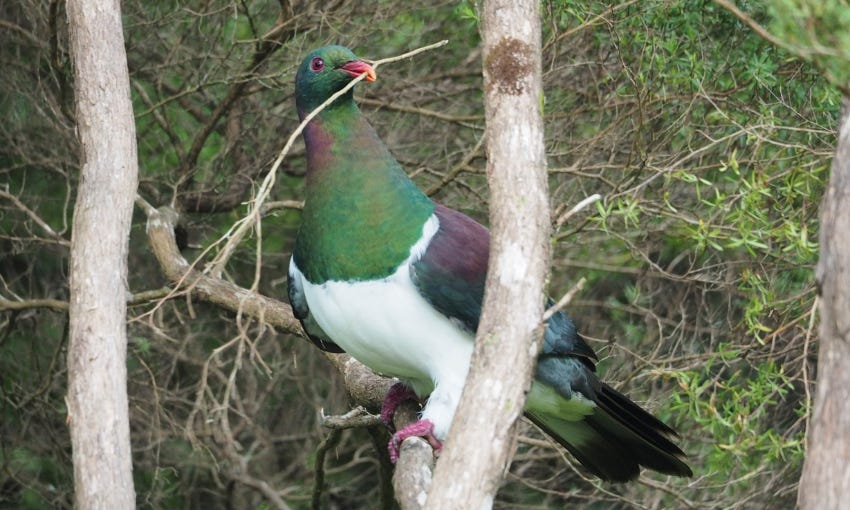Kia ora, welcome to Future Proof brought to you by AMP. I’m Ellen, thanks for joining me this week.
One of the great joys of the summer break is slowing down. Relentless short horizons stretch out; maybe we dream a little more about the year ahead. I always hope to carry this slower pace with me – but now I’m also wondering: What if our horizons stretched even more, and we dreamed even further ahead? That’s the premise of The Good Ancestor, one of my favourite reads from this summer recommended by a friend as a salve for doom and gloom.
The book, by philosopher Roman Krznaric, encourages us to look past quarterly reports, election terms and even individual lifetimes to think long-term – like, 1,000-years long term. What can we start creating now that will benefit future generations?
Sometimes this approach is called “cathedral thinking”: big, bold projects that take more than a lifetime to complete, but that have enduring impacts. It doesn’t come in a breakthrough moment or a sudden flash. It’s incremental and maybe we can’t see what the ceiling will look like just yet. But slow change can be radical change too. It’s an approach we need more of to tackle the climate crisis, some say – Greta Thunberg referenced cathedral thinking in a speech back in 2019.
Such intergenerational work is already in motion here in Aotearoa. Nadine Anne Hura writes beautifully about the Māori climate adaptation solutions she has encountered on recent travels: “Everywhere I went, from Ihumātao to Tairāwhiti to Whanganui, I found marae communities invested in work they aren’t likely to witness flourishing fully within their lifetime – let alone personally benefit from,” she says. “This work includes liberating and restoring wetlands, revitalising ancient food-gathering practices, replanting native forests, establishing anti-capitalist regenerative economies, reclaiming mātauranga, and so much more.”
It’s no surprise that in searching for ways to be a good ancestor, Krznaric turns to Indigenous philosophies, including the te ao Māori concept of whakapapa which binds a person to ancestors, to future generations, and to the wider living world. This powerful genealogical web of life inspires care: “Kaitiakitanga is about intergenerational sustainability. You aim to be a good ancestor,” says Dan Hikuroa, an expert in weaving together science and mātauranga.
Protecting the future for the next generation is a universal climate motivator, a recent global survey found. In testing different climate messages with more than 60,000 people from 23 countries (not including New Zealand), one key message outperformed the others: “Across every country, love for the next generation was the dominant reason for action on climate change,” the report authors write. “This reason was 12 times more popular than creating jobs.”
“The big motivator is protecting what we love.”
AMP believes that investing in a sustainable future is the best way to achieve long-term investment success. That's why they integrate environmental, social, and governance (ESG) factors into all of their investment decisions.
AMP supports companies that are making a positive impact on the world while avoiding those that are causing harm. AMP is also working to reduce its own carbon footprint and achieve a net zero outcome by 2050 or sooner.
Walkable cities become subject of conspiracies
Denial of basic climate change science has waned while attacks on climate solutions have risen rapidly, according to an analysis of 12,000 YouTube videos with a total 3.4 billion views in 2023. This new flavour of disinformation includes arguments that solar power is bad for the economy and environment, as well as conspiracy theories that equate the urban planning concept of 15-minute cities – where daily services and needs are within a 15-minute walk or cycle of your home – with “climate lockdowns”. These views are present in New Zealand too, Byron Clark writes on The Spinoff. In June 2023, hundreds of conspiracy theorists hijacked a meeting in Hamilton on the 20-minute city concept, and attempted a citizen’s arrest of city councillors.
End of Clean Car Discount set to spur climate pollution
Repealing the Clean Car Discount, which provided rebates for low-emissions vehicles, means New Zealand will release carbon pollution almost equivalent to a year of non-stop coal burning by the Huntly power station, Marc Daalder reports for Newsroom. Meanwhile, drivers of electric vehicles and plug-in hybrids will have to pay road user charges from 1 April, with “unfair” methodology meaning EV drivers will, in some cases, be paying twice as much as an equivalent petrol vehicle, RNZ’s Eloise Gibson reports. This bad news for EVs comes alongside “a windy road ahead” for sustainable transport choices, as outlined in The Bulletin late last week.
Greenwashing terms banned in EU from 2026
The EU has voted to ban greenwashing product labels from 2026. Using terms like “environmentally friendly”, “natural”, “biodegradable”, “climate neutral” or “eco” will require evidence under a certification scheme, and use of carbon offsetting to back up claims won’t be allowed.
The European Commission is set to call on the EU to cut its greenhouse gas emissions by 90% compared to 1990 levels by 2040, Politico reports. Previous climate targets have required unanimous approval from all 27 EU country leaders. So far, Denmark, Poland and Bulgaria have expressed openness to the interim goal, designed to bridge the gap to net zero by 2050.
The Spinoff is powered by its supporters
In 2023, Spinoff readers funded some of our most beloved, well-read and impactful work. Help Me Hera, The Cost of Being, powerful longreads, Election 2023 coverage, laugh out loud satire, Wellington stories, Christchurch stories and everything in between was powered by Spinoff members and donors. If you did support us, thank you from all of us at The Spinoff. If helping fund well-crafted and insightful journalism is on your list for 2024, donate today or sign up to become a Spinoff member.
More stories
“There are going to be winners and losers, and some of the losers will be very noticeable”: Some animals might be able to adapt to a changing climate, especially if they have lots of genetic diversity.
Could we – or should we – protect polar glaciers from warm water with giant underwater curtains?
Heavy bottom trawl fishing nets churn up the seafloor, releasing millions of tonnes of planet-heating carbon, new research estimates.
How to create your own lizard-friendly garden.
Why socioeconomic inequality is holding back climate action.
Norway has made the controversial decision to allow exploratory deep-sea mining, despite warnings from scientists about environmental impacts.
Image credit: Ellen Rykers.
To finish this edition, please admire this industrious kererū who is one half of a couple busy building a nest in a tall tree outside my house. I am enjoying hearing their soft coos to one another, and watching them gather twigs from around my backyard for their construction project.
Keeping it coo with the kererū,
Ellen
Got some feedback about Future Proof or topics you’d like covered? Get in touch with me at futureproof@thespinoff.co.nz














Thanks Ellen for an uplifting and informative Future Proof. Keep an eye on those nesting kereru - we had two who successfully hatched a chick (such a scruffy nests, too) but a local cat was also up with the process and waited until the chick was about to fledge before pouncing on it.
It was devastating!